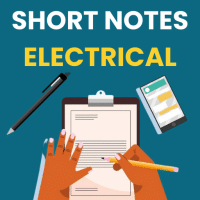Electrical Engineering (EE) Exam > Electrical Engineering (EE) Questions > Materials which allow the passage of electric...
Start Learning for Free
Materials which allow the passage of electric current are known as______
- a)Insulators
- b)Conductors
- c)Dielectrics
- d)Semi-conductors
Correct answer is option 'B'. Can you explain this answer?
Verified Answer
Materials which allow the passage of electric current are known as____...
Conductors are materials(mostly metals), which freely allow the passage of electrons through it. If electrons can flow freely through a material, it implies that even current can flow freely through that material since current is the rate of flow of electrons.
Most Upvoted Answer
Materials which allow the passage of electric current are known as____...
Conductors: Materials that allow the passage of electric current
Conductors are materials that have the ability to allow the flow of electric current through them. These materials have a high number of free electrons that are loosely bound to their atomic structure. When an electric potential difference is applied across a conductor, these free electrons are able to move freely through the material.
Characteristics of Conductors:
1. High Electrical Conductivity: Conductors have a high electrical conductivity, which means they offer low resistance to the flow of electric current. This is due to the presence of a large number of free electrons that can easily move through the material.
2. Low Resistivity: Conductors have low resistivity, which is a measure of the material's ability to resist the flow of electric current. Low resistivity allows for efficient transmission of electric current through the material.
3. Good Heat Conductivity: Conductors also have good heat conductivity, which means they can effectively transfer heat. This property is useful in applications where heat dissipation is important, such as in electrical wiring or heat sinks.
4. Metallic Properties: Most conductors are metals, which exhibit metallic properties such as malleability, ductility, and shiny appearance. These properties are a result of the metallic bonding between atoms in the material.
5. Low Voltage Drop: Conductors have a low voltage drop when electric current flows through them. This means that there is minimal loss of voltage along the length of the conductor, allowing for efficient power transmission.
Examples of Conductors:
1. Copper: Copper is one of the most commonly used conductors due to its high electrical conductivity, low resistivity, and good heat conductivity.
2. Aluminum: Aluminum is another widely used conductor, particularly in power transmission lines, due to its relatively high electrical conductivity and lower cost compared to copper.
3. Silver: Silver is the most conductive material and is used in specialized applications where high conductivity is required.
4. Gold: Gold is also a highly conductive material and is commonly used in electronic components and connections.
5. Iron and steel: Although not as conductive as copper or aluminum, iron and steel are still used as conductors in certain applications, such as in power distribution systems.
In conclusion, conductors are materials that allow the passage of electric current due to their high electrical conductivity and low resistivity. Examples of conductors include copper, aluminum, silver, gold, iron, and steel.
Conductors are materials that have the ability to allow the flow of electric current through them. These materials have a high number of free electrons that are loosely bound to their atomic structure. When an electric potential difference is applied across a conductor, these free electrons are able to move freely through the material.
Characteristics of Conductors:
1. High Electrical Conductivity: Conductors have a high electrical conductivity, which means they offer low resistance to the flow of electric current. This is due to the presence of a large number of free electrons that can easily move through the material.
2. Low Resistivity: Conductors have low resistivity, which is a measure of the material's ability to resist the flow of electric current. Low resistivity allows for efficient transmission of electric current through the material.
3. Good Heat Conductivity: Conductors also have good heat conductivity, which means they can effectively transfer heat. This property is useful in applications where heat dissipation is important, such as in electrical wiring or heat sinks.
4. Metallic Properties: Most conductors are metals, which exhibit metallic properties such as malleability, ductility, and shiny appearance. These properties are a result of the metallic bonding between atoms in the material.
5. Low Voltage Drop: Conductors have a low voltage drop when electric current flows through them. This means that there is minimal loss of voltage along the length of the conductor, allowing for efficient power transmission.
Examples of Conductors:
1. Copper: Copper is one of the most commonly used conductors due to its high electrical conductivity, low resistivity, and good heat conductivity.
2. Aluminum: Aluminum is another widely used conductor, particularly in power transmission lines, due to its relatively high electrical conductivity and lower cost compared to copper.
3. Silver: Silver is the most conductive material and is used in specialized applications where high conductivity is required.
4. Gold: Gold is also a highly conductive material and is commonly used in electronic components and connections.
5. Iron and steel: Although not as conductive as copper or aluminum, iron and steel are still used as conductors in certain applications, such as in power distribution systems.
In conclusion, conductors are materials that allow the passage of electric current due to their high electrical conductivity and low resistivity. Examples of conductors include copper, aluminum, silver, gold, iron, and steel.
Free Test
FREE
| Start Free Test |
Community Answer
Materials which allow the passage of electric current are known as____...
B

|
Explore Courses for Electrical Engineering (EE) exam
|

|
Question Description
Materials which allow the passage of electric current are known as______a)Insulatorsb)Conductorsc)Dielectricsd)Semi-conductorsCorrect answer is option 'B'. Can you explain this answer? for Electrical Engineering (EE) 2025 is part of Electrical Engineering (EE) preparation. The Question and answers have been prepared according to the Electrical Engineering (EE) exam syllabus. Information about Materials which allow the passage of electric current are known as______a)Insulatorsb)Conductorsc)Dielectricsd)Semi-conductorsCorrect answer is option 'B'. Can you explain this answer? covers all topics & solutions for Electrical Engineering (EE) 2025 Exam. Find important definitions, questions, meanings, examples, exercises and tests below for Materials which allow the passage of electric current are known as______a)Insulatorsb)Conductorsc)Dielectricsd)Semi-conductorsCorrect answer is option 'B'. Can you explain this answer?.
Materials which allow the passage of electric current are known as______a)Insulatorsb)Conductorsc)Dielectricsd)Semi-conductorsCorrect answer is option 'B'. Can you explain this answer? for Electrical Engineering (EE) 2025 is part of Electrical Engineering (EE) preparation. The Question and answers have been prepared according to the Electrical Engineering (EE) exam syllabus. Information about Materials which allow the passage of electric current are known as______a)Insulatorsb)Conductorsc)Dielectricsd)Semi-conductorsCorrect answer is option 'B'. Can you explain this answer? covers all topics & solutions for Electrical Engineering (EE) 2025 Exam. Find important definitions, questions, meanings, examples, exercises and tests below for Materials which allow the passage of electric current are known as______a)Insulatorsb)Conductorsc)Dielectricsd)Semi-conductorsCorrect answer is option 'B'. Can you explain this answer?.
Solutions for Materials which allow the passage of electric current are known as______a)Insulatorsb)Conductorsc)Dielectricsd)Semi-conductorsCorrect answer is option 'B'. Can you explain this answer? in English & in Hindi are available as part of our courses for Electrical Engineering (EE).
Download more important topics, notes, lectures and mock test series for Electrical Engineering (EE) Exam by signing up for free.
Here you can find the meaning of Materials which allow the passage of electric current are known as______a)Insulatorsb)Conductorsc)Dielectricsd)Semi-conductorsCorrect answer is option 'B'. Can you explain this answer? defined & explained in the simplest way possible. Besides giving the explanation of
Materials which allow the passage of electric current are known as______a)Insulatorsb)Conductorsc)Dielectricsd)Semi-conductorsCorrect answer is option 'B'. Can you explain this answer?, a detailed solution for Materials which allow the passage of electric current are known as______a)Insulatorsb)Conductorsc)Dielectricsd)Semi-conductorsCorrect answer is option 'B'. Can you explain this answer? has been provided alongside types of Materials which allow the passage of electric current are known as______a)Insulatorsb)Conductorsc)Dielectricsd)Semi-conductorsCorrect answer is option 'B'. Can you explain this answer? theory, EduRev gives you an
ample number of questions to practice Materials which allow the passage of electric current are known as______a)Insulatorsb)Conductorsc)Dielectricsd)Semi-conductorsCorrect answer is option 'B'. Can you explain this answer? tests, examples and also practice Electrical Engineering (EE) tests.

|
Explore Courses for Electrical Engineering (EE) exam
|

|
Signup for Free!
Signup to see your scores go up within 7 days! Learn & Practice with 1000+ FREE Notes, Videos & Tests.


















